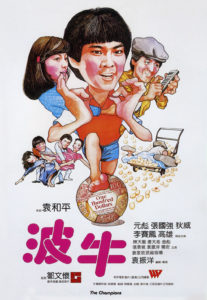Director: Chang Cheh
Co-director: Pao Hsueh Lieh
Producer: Runme Shaw
Cast: Chen Kuan Tai, Cheng Lee, Guk Fung, Tin Ching, David Chiang, Wong Ching, Mario Milano, Fung Hak On, Wong Chung, Geung Nam
Running Time: 128 min.
By Numskull
The Boxer from Shantung combines martial arts action with an earthy 1930s gangster story, and while neither element is of extraordinary quality, the synthesis makes for a pretty enjoyable film that quickly dispatches the visions of Shaolin monks, murdered paternal figures, and ninjas in garishly colored costumes that the phrase “kung fu movie” often conjures up.
Ma Yongzhen is the film’s protagonist (“Hero” would be pushing it, despite the fact that the 1997 remake is called just that), Xiao Jiangbei is his meek but loyal buddy, Tan Si is the affable crime lord he idolizes, and Boss Yang is Tan Si’s rival…and, therefore, Ma’s as well. Ma and Xiao are manual laborers busting their asses in Shanghai at the beginning of the film, and Ma’s first encounter with Tan Si starts him off on the underworld influence ladder. Step by step, he earns the respect of everyone he meets, either with his strength of character or by beating them up. When he gets a really big break by defeating a Russian strongman, he indulges himself in a fancy cigarette holder, much like the one Tan Si uses. However, he is mindful of his humble beginnings, and of the fact that times are still tough for many in Shanghai. He shares his good fortune with his old fellow wage slaves, and when they assist him in his various extralegal activities, he lectures them on the futility of trying to extort money from people who simply don’t have any to spare.
The tea house that Ma and his underlings frequent employs a singer, Jin Lingzi, and her uncle, who provides the music. Ms. Jin’s hopes that Ma’s arrival will mark a turn for the better for conditions in the crime-plagued city are dashed when she ascertains that he isn’t different enough from the other bosses she’s seen rise and fall. This is a plot element that I could have done without, but since it never blooms (decays?) into a full-fledged romance, it’s bearable.
There are fights here and there; some minor scuffles and a mass brawl or two. The lot of them combined can’t match the intensity of the staggering finale. Ma Yongzhen, alone and badly injured, must fight Boss Yang’s champion fighters and (literally) dozens of hatchet-wielding thugs. His foes treat him as they would a wounded animal, knowing the advantage is theirs but reluctant to approach, not wanting to be one of the few he takes out should they decide to rush him. This is one of the “angriest” fight scenes you’re ever likely to see, as well as one of the bloodiest. As with the other fights, the choreography is very much lacking in finesse and “prettiness”; kung fu showboating has no place here. The psychology of this sequence is excellent; rather than going for the frantic adrenaline rush, it paces itself in such a way that the viewer has plenty of time to wonder how long it will take for Ma to fall victim to a fateful blow, drop dead from blood loss, or maybe…just maybe…emerge victorious. You can see the inspiration in the climaxes of Gordon Chan’s Beast Cops, in which the maniacal Anthony Wong keeps fighting out of sheer hatred when he really ought to be dead or comatose, as well as in John Woo’s silly-ass A Better Tomorrow 2, in which the good guys get shot multiple times with little ill effect.
The Boxer from Shantung utilizes a somber musical score and a quietly memorable ending, as if the movie itself knows what sort of misery lies ahead for China, but the characters within it do not (or perhaps are underestimating it). The acting is sufficient, though David Chiang and his gleaming grin give Tan Si a weird hammy flavor that some may find annoying. Also, Chen Kuan Tai’s (Ma Yongzhen’s) default facial expression is one of irritating smugness. Only at the sight of his own blood (and boy is there a lot of it) does he get rid of it. Speaking (again) of blood, in this film it’s an unnaturally bright red; a minor but constant source of annoyance. Ah well, at least it isn’t that pink Kool-Aid shit.
So, that’s that. A solid movie, this, that shouldn’t be lumped together with Shaolin This and Kung Fu That. The sheer audacity of the last 20 minutes in and of itself makes it well worth your time.
Numskull’s Rating: 8/10
By Joe909
One of the early Shaw Brothers movies, Boxer from Shantung doesn’t have much in common with later Chang Cheh movies. It’s actually filmed outdoors, instead of in the Shaw Brothers studios, there are no colorful costumes or exotic weapons, and it’s more of a bona fide movie than a chop-sockey epic. It’s also very slow-moving, when compared to later SB flicks. As a matter of fact, this movie was so slow-moving that my friend and I drifted off (my wife was already long asleep), until we were re-invigorated by the bloody, cathartic finale.
Pure and simple, this movie is a direct lift of the “Godfather.” Warring factions, young upstart who carves out his own territory, ambushes, backstabbings, etc. The only difference is, there isn’t a gun in sight in Boxer from Shantung, and no horse heads magically appear in beds. This is one of those movies where everyone wears the same sort of clothing throughout the film: those old-style, bathrobe-looking Chinese outfits. Only David Chiang dresses differently, wearing a Western three-piece suit. The problem with this is that everyone in the movie looks the same, and also these costumes aren’t as aesthetically pleasing as the later, eccentric Shaw Brothers costumes.
Knives and hatchets are the weapons of choice. The evil, old boss employs a legion of axe-carrying goons, who for some reason, no matter the opportunity, refuse to throw their axes. Instead, they use them more like knives. If you’re carrying a throwing axe, throw the damn thing! There are a few fights before the finale, but they aren’t that fast, and poorly choreographed, when compared to later kung-fu movies. Throughout this film I kept comparing it to “Way of the Dragon,” the Bruce Lee movie that was produced the same year as this. It’s amazing how much faster Bruce was than any of these guys. No wonder his movies were such a lightning bold in Asia.
Things meander for a couple of hours as the plot builds. Ma gets some power after beating a foreign wrestler in a tournament. He then goes on to face down challenges from other bosses, but there’s no real spark until the final twenty minutes of the movie. Ma goes to a restaurant to meet with a rival boss, but it’s an ambush. Everyone in the restaurant is under the boss’s control, and carries either a knife or a hatchet.
The fight starts out badly for Ma, as he takes a hatchet to the gut. But he’s just gotten started. Ma proceeds to fight every person in the restaurant, even though he bleeds enough for two men. Gallons pour out of him. The lower half of his body is literally drenched in crimson. This end fight is pure Shaw Brothers material, a big step up from the preceding two hours of boredom. Chen Kuan Tai moves fast, and finally lets loose. The ending of Boxer from Shantung is without a doubt the bloodiest finale I’ve ever seen in a kung-fu movie.
So if you’re looking for the usual Shaw Brothers flick, this will leave you uninspired. But if you’re looking for an old-school kung-fu film that was made back in the days when kung-fu movies were more like “real” movies with some martial arts thrown in, you’ll be in for a treat. Either way, the ending will blow you away.
Joe909’s Rating: 5/10























Be the 1st to Comment